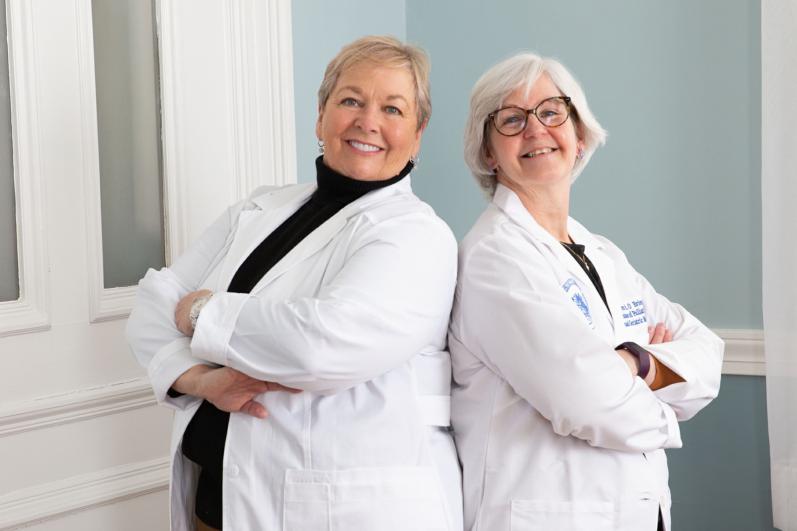Award-winning CatholicTV show sheds light on palliative care
WATERTOWN -- Two healthcare professionals sit at a kitchen table, coffee mugs in hand, and talk about their work. They might have a topic chosen ahead of time, but the conversation flows freely, a result of their expertise and long friendship.
This is the format of "Talking of Palliative Care," an award-winning program by CatholicTV, featuring MC Sullivan, the archdiocese's chief healthcare ethicist, and Dr. Karen O'Brien, co-director of inpatient palliative care at Massachusetts General Hospital. The two women have been friends and colleagues for many years, and both are passionate about palliative care, an area of healthcare that is widely misunderstood, particularly in Catholic institutions.
Both Sullivan and O'Brien have encountered people in healthcare -- both professionals and patients -- who mistake palliative care for hospice or end-of-life care, or wrongly assume it involves hastening a patient's death.
Speaking to The Pilot on June 13, Sullivan said that when she was hired to start a palliative care initiative in the archdiocese, she knew that she wanted to utilize the media in her outreach and educational efforts. For this project, she said, "I wanted to take the fear out of palliative care."
In the first episode of the show, Sullivan and O'Brien discuss the history and definition of palliative care and what makes it different from hospice. Sullivan describes palliative care as an interdisciplinary approach to the care of any patient with a serious illness, addressing their physical, emotional, psychosocial, and spiritual needs. Hospice, on the other hand, is care for the last six months or so of a patient's life, and so is not concerned with seeking a cure.
O'Brien makes the case that while all hospice is palliative care, not all palliative care is hospice.
"Our goal was to educate people about what palliative care really is and what hospice is, and what they should be able to expect from that," O'Brien said in a June 14 interview.
They filmed the first season of "Talking of Palliative Care" in November 2020, and it aired in the spring of 2021. Over the course of the first 13 episodes, they covered basic aspects of palliative care, such as advanced planning, healthcare proxies, and ethical and religious directives.
Sullivan said the response to the show was "instantaneous and amazing." She and O'Brien have received letters, emails, and phone calls from people either thanking them or asking for advice in matters of palliative care. They have even been stopped at church or in the street by people who recognize them.
"It's lovely to know that what we did is impactful, and more than that, that it's helpful," Sullivan said.
She said it has been "exciting" to hear people say it has made a difference in their lives.
"That's particularly poignant and very moving, because if it makes a difference in their lives, it's because they are dealing with serious illness in their lives, either of themselves or of family or loved ones," Sullivan said.
The first season was so well received that they decided to develop a second season focusing more on clinical work. They filmed 13 new episodes in late 2021 and early 2022, covering topics like caregiver burnout, pediatric palliative care, and pain management. The new episodes began airing in April and come out once a week. They are now considering the creation of a third season, which would dive deeper into different topics.
Earlier this month, the show won a bronze Telly Award in the category of health and safety. The Telly Awards honor excellence in video and television across all screens.
"It was really nice, because the intent of this was to be able to educate people about this, that palliative care is a great benefit that is so underutilized by people. To win an award was just kind of over-the-top," O'Brien said.
The topic of palliative care is particularly relevant in Massachusetts today, as the legislature considers a bill to legalize physician-assisted suicide (PAS) in the commonwealth. PAS advocates often cite patients' desires to not be in pain or be a burden on others, but palliative care is largely about helping patients avoid those experiences.
Sullivan has testified against PAS legislation many times, explaining why it is not good policy.
"I say that it's putting the cart before the horse, policy-wise. Until there is robust palliative care available to everyone, then patients will not be making either informed decisions or decisions that reflect a consideration of options," Sullivan said.
O'Brien said that palliative care should be part of every Catholic healthcare institution.
"When it's done right, and with care and loving and not hastening death, it is totally consistent with the teachings of the Church. When people are most frail and most vulnerable, that's when they need the most care. They need to be accompanied, both in their symptoms but also in their spiritual life and their social life," O'Brien said.
She said that the show has made her and Sullivan accessible to many people they otherwise might not have been able to reach.
"It's really been rewarding to be able to do this, much more than I ever expected," O'Brien said.
New episodes of "Talking of Palliative Care" are released on Thursdays at 11 a.m. on CatholicTV. All previous episodes can be viewed at www.catholictv.org/talking-of-palliative-care-episodes.html.



















